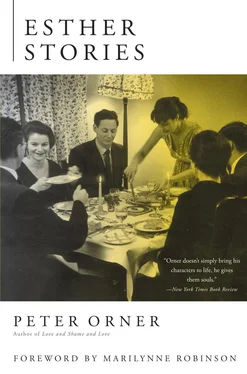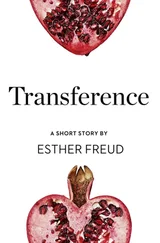And Growling Poe said it again, except this time it wasn’t a question. “Have I seen your kitty. My dear, Muddy, I’m afraid I have. Something’s happened.”
“To Punim?”
“Yes, to Punim.” He jabbed a finger toward a folding chair. “Sit.” And as the old bird watched in terror, begging him to return Punim alive, Growling Poe launched into his second act, an abbreviated telling of “The Black Cat,” cutting right to the moment when the pet assassin reaches down and gouges out the eye of the feline who torments him with love.
Although on the surface at least, Smiling Poe was a kinder man than Growling Poe — all the merchants downtown would tell you this — Smiling Poe didn’t have much better luck luring people down to the catacombs for his shows. So why, you ask, an Edgar Allan Poe Festival in our town when our idea of theater is the high school’s annual abomination of Li’l Abner ? It’s a good question, but if you have to ask, you don’t know Rita Larry-Pontewitz. Rita Larry-Pontewitz is famous for being a thrice-widowed eccentric with incurable boredom and more money than our town’s two savings-and-loans can handle. She likes to pretend that we care more about culture than we actually do. Thus, every few years or so she pours a little of her fortune into a project designed to bring us culture and tourist revenue. “Gonna put us on the map,” she shouts, as she cruises down our sidewalks in her golf cart, handing out flyers for the ballet, the opera, ancient Chinese table dancing. She’s never asked us if we wanted anybody to find us or not, but we tolerate her because she often donates money for things we do need, like a new monorail system connecting our downtown with our new mall and the reconstructed driving range and put-put center we named in her honor.
In the beginning, we were even excited about the festival and hauled out our forgotten copies of Poe from cardboard boxes in the basement and stayed up nights rereading “The Masque of the Red Death,” “The Oblong Box,” “Hop-Frog,” and “The Murders in the Rue Morgue,” after which we were again surprised and mildly annoyed that those killings were all an innocent monkey’s havoc. We dutifully attended the art exhibitions and the Vincent Price movies, and we happily bought tickets for the one-man shows given in the basement of our Historical Society, which the society president and chief tour guide, Hal Hodapp, renamed the catacombs. The catacombs were a dank, cramped basement filled with stacks of molding telephone books that made people sneeze so loudly and profusely during performances you sometimes couldn’t hear either Poe. But Hal Hodapp, who serves also as Rita Larry-Pontewitz’s unofficial propagandist, circulated the story that the basement of the Historical Society had been an execution chamber back when beheading was still legal in our county. (New Hampshire Puritans don’t mess around.) So the catacombs it was, no matter how much mold, and Hal, who shared Rita’s desire to put us on the map, placed signs along the I-73 corridor to attract tourists to the festival. SEE NOT ONE BUT TWO EDGAR A. POES IN CHAMBER OF LOST HEADS.
Most people in town saw both Growling Poe’s and Smiling Poe’s show at least once. All well and good. We clapped and clapped and we clapped. That was that. Our literary interlude was over. We tromped our books back down to the basement, because they crowded our shelves. Then an odd thing. They didn’t leave. Even after the rest of the festival packed it up and moved on to Ossipee. Even after Rita herself lost all interest in Edgar Allan Poe and disparaged him and his impersonators in the streets, a mother casting stones at her babies. “All right, enough already!” she yowled from her golf cart. “Besides, the real one was a drunk and married his eight-year-old sister! Is this the kind of role model we want to encourage for today’s lusty youth?” She’d already begun to plan her next project, a tribute to our town’s glassblowing heritage. To his credit — though he began to do Rita’s bidding by inventing a glassblowing heritage, complete with an archaeological dig behind Shaw’s — Hal Hodapp stuck with the Poes and didn’t, despite Rita’s thunder, evict them from the catacombs. Hal maintained that their voices kept the rats from coming upstairs and gnawing the carpet.
Neither Poe ever spoke to the other. We assumed, without giving it much thought, that the nature of being Poe is such that there can’t be more than one of you. Why they both decided to stay is anyone’s guess, but I’d say the two Poes agreed on one thing: that art need not be seen by human eyes to be art, even when it’s drama. Still, it was funny to see two identically dressed men in period clothes pass each other on the street without a word, Growling Poe glaring, Smiling Poe raising the corners of his mouth — slightly — but enough for us to notice and remark that the more he smiled, the worse he looked.
They kept at it, week after week, month after month, depending on handfuls of tourists. Hal told us that in February there was no audience for either show for two weeks running. But every weeknight and Saturday they went on anyway, performing entire shows for rows of empty folding chairs. Hal knew because he lived upstairs at the Historical Society and admitted, when Rita Larry-Pontewitz wasn’t around, that he liked to listen to the Poes from the open door of an old laundry chute.
At this point, I should confess, though I am no one important, that I felt there was something not quite right about Smiling Poe. He had, if this is possible, too much talent for his work. For me, Growling Poe was easier. He was a simple, vengeful man and therefore consistent. His openly hostile demeanor when he walked our streets matched his stage presence. His show was mostly shouted fury. Growling Poe’s Poe anticipated that the world would turn against him — and the world delivered as promised. When I saw Growling Poe’s show, I was depressed, anxious, pessimistic, but never afraid. I didn’t fear death to the degree of a constant squeezing pressure against the temples. Growling Poe didn’t overcome me with dread. But isn’t dread what we ask of a Poe? I, who have never had anybody to lose and am still waiting, know that even Growling Poe’s delivery of “The Raven” was complacent. It was as if he’d always expected to lose Lenore. Growling Poe reveled in the easy and dismal; what could this misery known as life bring you other than the loss of the only one you ever loved? And so, he enjoyed his own anger too much to feel a single word of the poem he had memorized, acted so beautifully. He missed the point. Wasn’t it Emerson who said that every single word is a poem? If anyone ever has, the real Poe understood this too well, as his hand stiffened and he could no longer hold his pen to write even one more of Emerson’s sacred words in that cold house of his. And you know damn well that he couldn’t reach for his wife’s precious little hand, because she, young thing, was as cold as he was, and after that she was dying, and the dying have no warmth to give the living. Forgive me for getting carried away. Because we know all this, don’t we? We’ve heard it all before. We die alone, and the real Poe wrote this out in his own blood, and though Growling Poe had done all his homework (in his program notes he wrote that he’d read all the books in Roderick Usher’s library, including, of course, the Directorium Inquisitorium by the Dominican Eymeric de Gironne), he never understood how quickly our anger at being left dissolves into a loneliness no words can describe, not even words on the page. You can’t take hold of the powdered hands of the dead, and this is what Smiling Poe understood too well. Embedded in his quiet smile was always the aloneness of grasping for a hand that’s gone.
Читать дальше












